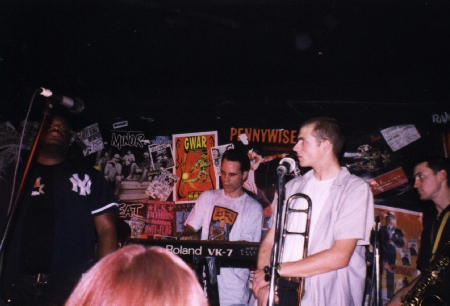|
|
|

Without ska music, there would be no reggae, no dancehall, no Bosstones, no Fishbone and No Doubt. Without the Toasters, there would be no contemporary ska scene. Billboard Magazine calls them "ska pioneers," and the wildly energetic, high octane group is widely known as America's premiere ska band. But what is ska? "It's really uptempo dance music, like reggae on crack," explains Rob Hingley, the group's founder and guitarist/vocalist. With infectious dance beats and vivid horn bursts, ska has hovered on the edge of the mainstream for years. Introduced in the early sixties, the musical form has shifted through several phases over the years: rocksteady Jamaican reggae, the faster, more hyper two-tone approach and, most recently, punk/ska. The Toasters came together some fifteen years ago when England native Hingley was working at the Forbidden Planet in New York. He put the band together with some of his coworkers and his keyboard player roommate "to have something to do after work." Taking their name from a Jamaican style of rapping called "toasting," the group debuted their first single in 1983 and were the first U.S. ska band to release a record in Japan, Europe and Argentina. 1983 was also the year Hingley founded Moon Ska Records, America's first and foremost all-ska label, which nurtures and promotes both homegrown (Let's Go Bowling, the Slackers, the Bluebeats, Hepcat, Dance Hall Crashers) and international ska talent (the Busters, Bad Manners, Arsenals, Porkers, House of Rhythm). The band tours constantly, playing sold-out shows seven days a week and enjoying the new-found attention ska music has been getting lately. "As it stands, ska is growing," Hingley says, "but it's still underground and unspoiled, and I hope it stays that way even as it breaks. People had no idea at all what we were doing. People laughed at me, saying 'you'll never get anywhere in the U.S. playing ska music.' So now we're having the last laugh."